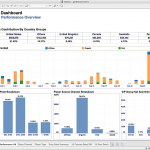The Role of Analytics: Move Over, Move Out, or Move Up
According to a recent CIO Magazine report, available data analytics positions have experienced an unprecedented growth that currently outpaces the number of qualified candidates. In light of this growth, McKinsey Global Institute projects that hundreds of thousands of data analytics positions will be made available within the United States by 2018. Oracle, IBM, Cisco, and other technology industry giants have advertised over 25,000 positions that require big data experience in the past year. However, as the number of available data analytics positions continue to increase, many companies are left wondering why the turnover rate for these seemingly “highly sought after” jobs remains at an all time high.
Why Is There A High Turnover Rate In Data Analysts?
Recent market studies revealed that the top five industries interested in hiring individuals with big data or data analytics experience include: Information Technology (IT), manufacturing, retail trade, finance and insurance, as well as professional, scientific, and technical services. From interns to executives, the demand for data experts continues to increase as organizations become more reliant on advanced digital tools and applications. As a result, continuous education on the latest tools, applications, and data analytics best practices becomes a necessity for any data analyst who wants to retain his or her job.
In fact, many industry experts argue that the reason for the high turnover rate in data analyst positions is due to the feverish pace with which new technologies are released. Data analysts are forced to continuously improve their skills or be left behind in the workforce. The challenge is magnified when a data analyst must find a way to meet job responsibilities, while simultaneously finding the time needed to complete job-related educational tasks. When companies fail to provide the training or resources needed for improving skills, data analysts are forced to find a new job where they are not “stretched thin” in an effort to keep up with both job responsibilities and job-related educational tasks.
Why Do So Many Companies Turn To Data Analytics Consultants?
Rather than spend the resources needed to educate internal data analysts, many companies choose to instead hire consultants or contractors. This tactic is derived from the belief that a consultant will provide value to the company by:
- Setting up the needed infrastructure around the data;
- Completing a knowledge transfer at the end of the project or contract; and
- Providing a fresh perspective that will lead to improved economic growth within the company.
While there is some truth to the aforementioned value, companies could greatly benefit from creating the right balance between internal data analysts and hiring expert-level consultants.
How Can Companies Create The Right Balance For Data Analytics?
If a company wants to “increase its bottom line,” then it needs to establish a balance between hiring fresh minds, i.e. expert consultants, and investing the resources needed to improve the skills of existing employees. Current data analysts, who show an interest and strength in their chosen area of expertise, should be given the incentives, tools, training, and education needed to improve their skills to the benefit of the company. In fact, employee psychology studies reveal that the more invested an employee becomes in a company, the more easily the employee will understand the company, and the greater the likelihood that the employee will consistently contribute to the company’s ROI through influential business decisions.
In order to achieve the fresh perspective needed to drive business innovations, companies should also retain a portion of their budget for hiring an expert within the data analytics field. This expert should be a consultant who can work with existing employees to deliver powerful business insights, provide the needed transfer of knowledge, and reduce the high turnover rate in data analyst roles that is caused by a lack of company-driven education. Through the help of a business intelligence and analytics consulting firm, such as getBIsmart, companies can establish the balance needed between providing data analytics training to existing employees and hiring consulting experts who can deliver the business analytics solutions needed to enable improved levels of user acquisition, engagement, and monetization within a business.
Visit our homepage to subscribe for more articles and updates









